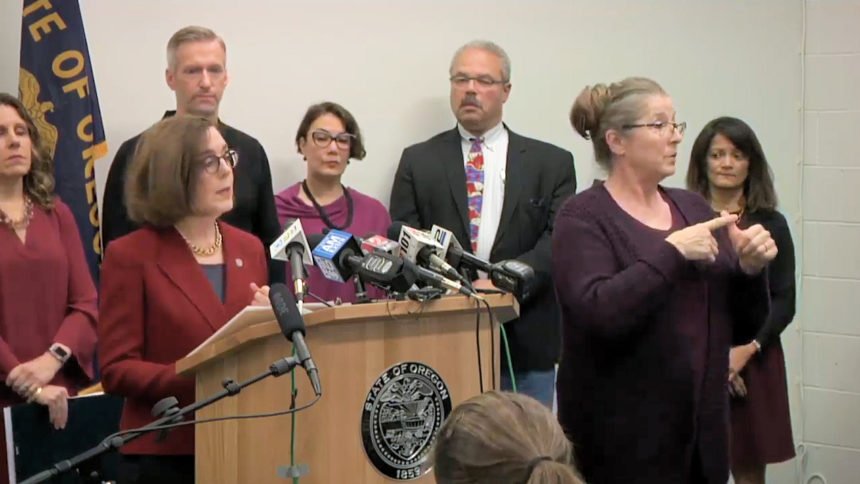Oregon prepares for fallout from coronavirus, school closures

SALEM, Ore. (AP) — Gov. Kate Brown said Friday that the state will help find child care for the children of front-line medical workers and first responders as schools statewide are closed for two weeks to slow the spread of the new coronavirus.
Oregon also obtained a federal waiver Friday to allow districts to serve free and reduced-price lunches to lower-income students outside a school setting, at places such as bus stops, churches and community centers.
About half of the 580,000 children in Oregon affected by the two-week closure of all school statewide receive meal subsidies, Oregon Department of Education Director Colt Gill said. School officials are developing take-out style meals that can be eaten at home and handed out in batches instead of hot meals that are served in schools, he said.
As for childcare for doctors and nurses, Brown equated it to a wartime effort to make medical workers available.
“I would put this as a World War II-capacity daycare for our public health workers because we’re going to need every single body we can get,” she said. “These are unprecedented times.”
Oregon schools will close Monday and remain closed until April 1. Oregon students already have spring break for one of those weeks.
Oregon has 30 confirmed cases of the coronavirus, including eight that have been diagnosed in the past two days among residents of a veterans’ nursing home in the town of Lebanon, about 80 miles south of Portland.
There could be 150 to 250 cases that haven’t been diagnosed, and it could grow to over 75,000 cases by mid-May unless action is taken, state health officer and epidemiologist Dean Sidelinger said.
For most people, the coronavirus causes only mild or moderate symptoms, such as fever and cough. For some, especially older adults and people with existing health problems, it can cause more severe illness, including pneumonia. The vast majority of people recover within a few weeks
Several school districts told Brown the coronavirus pandemic has brought them to the “breaking point” because of staffing issues involving older staff or those with health concerns, Brown said. About 40% of substitutes in the Portland Public Schools are over the age of 60, making them more vulnerable to the coronavirus, and support staff such as bus drivers and cafeteria workers also skew older and should be self-quarantining, she said.
She stressed that closing the schools would not stop the coronavirus from spreading and urged families not to leave their children in the care of older adults who are more vulnerable to the illness.
“I am reluctant to increase the burden on families who are already struggling to adapt to, and stay healthy, during this crisis,” Brown said. “Unfortunately, we are left with little choice.”
Also Friday, more than 400 doctors from around Oregon signed a letter to Brown demanding more resources and help to combat the spread of the new coronavirus.
The letter was made available online Thursday for doctors to sign and had 425 signatures by Friday afternoon. The letter acknowledges that Brown is in a difficult situation managing the crisis but said they are unequipped to handle the influx of coronavirus patients that could come.
“We see ourselves making decisions in the next two weeks on who will live and who will died because we don’t have resources sufficient to care for them,” the letter said. “We have heard the stories second- and farther-hand from China and Italy and have no reason to think Oregon won’t suffer the same fate. We truly must flatten the curve of the impact on our health care system.”
The doctors ask for a number of immediate changes and policies, including creating a statewide call center, a helpline for frontline medical workers and an ethics teams that would draft guidelines for doctors who may have to decide how to best use limited resources for patients.
The letter also suggests a tracking system for those in self-quarantine, taking over hotels to get the homeless population off the streets to better control the spread of the virus and separating nursing care residents into separate facilities for those who are sick and those who have tested negative for the new coronavirus.
“There are those who would judge you as being embarrassingly over-prepared or tragically under-prepared. We know which side you want to be on,” the letter read.
Brown said she did not see the need to take over hotels. Tina Edlund, her senior health policy advisor, said segregating nursing homes by the health of residents was under discussion as part of a larger plan to address viral spread, but nothing was certain.
Oregon earlier this week banned all gatherings of more than 250 people statewide for four weeks
The governor was meeting Friday with Oregon Health & Sciences University to discuss what is needed to prepare for a surge in hospital admissions if it comes.
“We are not getting the equipment we need and we are not getting the resources we need” from the federal government, she said. “This coronavirus is exposing cracks —I would say canyons — in our healthcare system.”